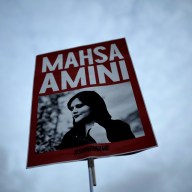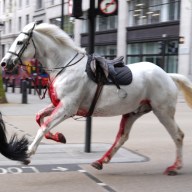HYANNIS PORT, Massachusetts – Sen. Edward M. Kennedy of Massachusetts, the last surviving brother in an enduring political dynasty and one of the most influential senators in history, died Tuesday night at his home on Cape Cod after a yearlong struggle with brain cancer. He was 77.
In nearly 50 years in the Senate, Kennedy, a liberal Democrat, served alongside 10 presidents – his brother John Fitzgerald Kennedy among them – compiling an impressive list of legislative achievements on health care, civil rights, education, immigration and more.
In a brief statement to reporters at his rented vacation home on Martha’s Vineyard, Massachusetts, President Barack Obama eulogized Kennedy as one of the “most accomplished Americans” in history – and a man whose work in Congress helped give millions new opportunities.
“Including myself,” added the nation’s first black president.
A source, speaking on grounds of anonymity because plans were still under way, told The Associated Press that Kennedy will be buried at Arlington National Cemetery. At the eternal flame rest four Kennedy family members, including the former president, Jacqueline Kennedy, their baby son, Patrick, who died after two days, and a still-born child. Former Sen. Robert Kennedy F. Kennedy is buried a short distance away.
Edward Kennedy’s only run for the White House ended in defeat in 1980, when President Jimmy Carter turned back his challenge for the party’s nomination. More than a quarter-century later, he handed then-Sen. Barack Obama an endorsement at a critical point in the campaign for the Democratic presidential nomination, explicitly likening the young contender to President Kennedy.
To the American public, Kennedy was best known as the last surviving son of America’s most glamorous political family, father figure and, memorably, eulogist of an Irish-American clan plagued again and again by tragedy. But his career was forever marred by an accident at Chappaquiddick in 1969, when a car he was driving plunged off a bridge, killing a young woman.
Kennedy’s death triggered an outpouring of superlatives from Democrats and Republicans as well as foreign leaders.
“An important chapter in our history has come to an end. Our country has lost a great leader, who picked up the torch of his fallen brothers and became the greatest United States senator of our time,” Obama said in a written statement.
“For five decades, virtually every major piece of legislation to advance the civil rights, health and economic well being of the American people bore his name and resulted from his efforts,” said Obama, vacationing at Martha’s Vineyard off the Massachusetts coast.
Kennedy’s family announced his death in a brief statement released early Wednesday.
“We’ve lost the irreplaceable centre of our family and joyous light in our lives, but the inspiration of his faith, optimism, and perseverance will live on in our hearts forever,” it said. “We thank everyone who gave him care and support over this last year, and everyone who stood with him for so many years in his tireless march for progress toward justice, fairness and opportunity for all.”
A few hours later, two vans left the famed Kennedy compound at Hyannis Port in pre-dawn darkness. Both bore hearse license plates – with the word “hearse” blacked out.
Several hundred miles away, flags few at half-staff at the U.S. Capitol, and Obama ordered the same at the White House and all federal buildings.
In his later years, Kennedy cut a barrel-chested figure, with a swath of white hair, a booming voice and a thick, widely imitated Boston accent. He coupled fist-pumping floor speeches with his well-honed Irish charm and formidable negotiating skills. He was both a passionate liberal and a clear-eyed pragmatist, willing to reach across the aisle.
He was first elected to the Senate in 1962, taking the seat that his brother John had occupied before winning the White House, and served longer than all but two senators in history.
His own hopes of reaching the White House were damaged – perhaps doomed – in 1969 by the scandal that came to be known as Chappaquiddick.
On the night of July 18, 1969, Kennedy drove his car off a bridge and into a pond on Chappaquiddick Island, on Martha’s Vineyard. Mary Jo Kopechne, a 28-year-old worker with Robert Kennedy’s campaign, was found dead in the submerged car’s back seat 10 hours later.
Kennedy, then 37, pleaded guilty to leaving the scene of an accident and received a two-month suspended sentence and a year’s probation. A judge eventually determined there was “probable cause to believe that Kennedy operated his motor vehicle negligently … and that such operation appears to have contributed to the death of Mary Jo Kopechne.”
He sought the White House more than a decade later, lost the Democratic nomination to President Jimmy Carter, and bowed out with a stirring valedictory that echoed across the decades: “For all those whose cares have been our concern, the work goes on, the cause endures, the hope still lives and the dream shall never die.”
Kennedy was diagnosed with a cancerous brain tumour in May 2008 and underwent surgery and a grueling regimen of radiation and chemotherapy.
He made a surprise return to the Capitol last summer to cast the decisive vote for the Democrats on Medicare. He made sure he was there again last January to see his former Senate colleague Barack Obama sworn in as the nation’s first black president, but suffered a seizure at a celebratory luncheon afterward.
He also made a surprise and forceful appearance at last summer’s Democratic National Convention, where he spoke of his own illness and said health care was the cause of his life. His death occurred precisely one year later, almost to the hour.
He was away from the Senate for much of this year, leaving Republicans and Democrats to speculate about the impact what his absence meant for the fate of Obama’s health care proposals.
Under state law, Kennedy’s successor will be chosen by special election. In his last known public act, the senator urged Massachusetts state legislators to give Democratic Gov. Deval Patrick the power to name an interim replacement. But that appears unlikely, leaving Democrats in Washington with one less vote for at least the next several months as they struggle to pass Obama’s health care legislation.
His death came less than two weeks after that of his sister Eunice Kennedy Shriver on Aug. 11. Kennedy was not present for the funeral, an indication of the precariousness of his own health. Of nine children born to Joseph and Rose Kennedy, only one – Jean Kennedy Smith, survives.
In a recent interview with The Associated Press, Kennedy’s son Rep. Patrick Kennedy, who represents Rhode Island, said his father had defied the predictions of doctors by surviving more than a year with his fight against brain cancer.
The younger Kennedy said that gave family members a surprise blessing, as they were able to spend more time with the senator and to tell him how much he had meant to their lives.
Kennedy arrived at his place in the Senate after a string of family tragedies. He was the only one of the four Kennedy brothers to die of natural causes.
Kennedy’s eldest brother, Joseph, was killed in a plane crash in World War II. President John F. Kennedy was assassinated in Dallas in 1963. Sen. Robert F. Kennedy was gunned down in Los Angeles as he campaigned for the 1968 Democratic presidential nomination.
Years later, in 1999, John F. Kennedy Jr. was killed in a plane crash at age 38. His wife died with him.
It fell to Ted Kennedy to deliver the eulogies, to comfort his brothers’ widows, to mentor fatherless nieces and nephews. It was Ted Kennedy who walked JFK’s daughter, Caroline, down the aisle at her wedding.
Politically, his concession speech at the Democratic convention in 1980 turned out to be a defining moment. At 48, he seemed liberated from the towering expectations and high hopes invested in him after the death of his brothers, and he plunged into his work in the Senate. In his later years, after he had divorced and remarried, he came to be regarded as a statesman on Capitol Hill, with a growing reputation as an effective, hard-working lawmaker.
His legislative achievements included bills to provide health insurance for children of the working poor, the landmark 1990 Americans with Disabilities Act, Meals on Wheels for the elderly, abortion clinic access, family leave, and the Occupational Safety and Health Administration.
He was also a key negotiator on legislation creating a Medicare prescription drug benefit for senior citizens, was a driving force for peace in Ireland and a persistent critic of the war in Iraq.
Senate Majority Leader Harry Reid of Nevada issued a statement that said, “It was the thrill of my lifetime to work with Ted Kennedy…..The liberal lion’s mighty roar may now fall silent, but his dream shall never die.”
Former first Lady Nancy Reagan said that her husband and Kennedy “could always find common ground, and they had great respect for one another.”
British Prime Minister Gordon Brown said: “Even facing illness and death he never stopped fighting for the causes which were his life’s work. I am proud to have counted him as a friend and proud that the United Kingdom recognized his service earlier this year with the award of an honorary knighthood.”
Born in 1932, the youngest of Joseph and Rose Kennedy’s nine children, Edward Moore Kennedy was part of a family bristling with political ambition, beginning with maternal grandfather John F. “Honey Fitz” Fitzgerald, a congressman and mayor of Boston.
Round-cheeked Teddy was thrown out of Harvard in 1951 for cheating, after arranging for a classmate to take a freshman Spanish exam for him. He eventually returned, earning his degree in 1956.
He went on to the University of Virginia Law School, and in 1962, while his brother John was president, announced plans to run for the Senate seat JFK had vacated in 1960.
Devastated by his brothers’ assassinations and injured in a 1964 plane crash that left him with back pain that would plague him for decades, Kennedy temporarily withdrew from public life in 1968. But he re-emerged in 1969 to be elected majority whip of the Senate.
Kennedy married Virginia Joan Bennett, known as Joan, in 1958. They divorced in 1982. In 1992, he married Washington lawyer Victoria Reggie. His survivors include a daughter, Kara Kennedy Allen; two sons, Edward Jr. and Patrick, a congressman from Rhode Island; and two stepchildren, Caroline and Curran Raclin.
Edward Jr. lost a leg to bone cancer in 1973 at age 12. Kara had a cancerous tumour removed from her lung in 2003. In 1988, Patrick had a noncancerous tumour pressing on his spine removed. He has also struggled with depression and addiction and announced in June that he was re-entering rehab.
Kennedy’s memoir, “True Compass,” is set to be published in the fall.
–
On the Net:
Kennedy’s office: http://kennedy.senate.gov
















